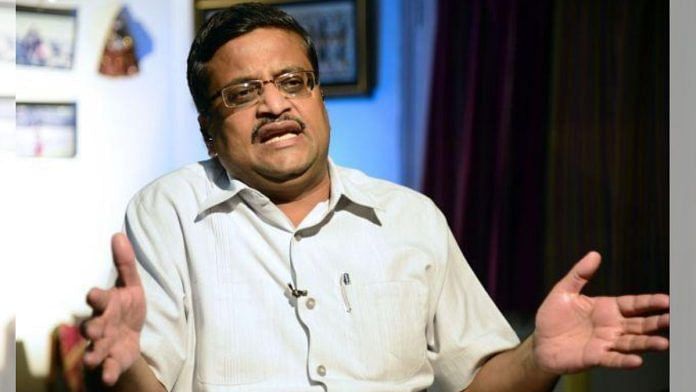New Delhi: Evaluation of an IAS officer’s competency is a specialised domain and ought to be left to the executive, the Supreme Court said Monday as it set aside the Punjab and Haryana High Court order that upheld higher grades allotted to Haryana IAS officer Ashok Khemka in his performance appraisal under All India Services (Performance Appraisal Report) Rules, 2007.
A bench of justices Vikram Nath and Satish Chandra Sharma observed that the HC had entered into a specialised domain by evaluating the competency of an IAS officer by way of contrasting and comparing the remarks and overall grades awarded by the reporting, reviewing and accepting authorities.
The three authorities are part of the three-tier system prescribed under the All India Services (Performance Appraisal Report) Rules, 2007 for performance appraisals of civil servants. In a state government set-up, the reporting authority is the immediate senior officer to whom the officer under evaluation reports, the reviewing authority is the minister of the department in which the officer is posted and the accepting authority is the chief minister.
“This was done without the requisite domain, expertise and administrative experience to carry out such an evaluation,” the bench observed.
The top court’s verdict came on an appeal filed by the state government against the HC ruling that set aside the Central Administrative Tribunal (CAT) order, which dismissed Khemka’s petition seeking deletion of the remarks and overall grades that were recorded by the accepting authority and restoration of the overall grades and remarks that were rewarded by the reviewing authority.
Khemka, a 1991-batch IAS officer, moved the CAT after then Haryana chief minister Manohar Lal Khattar downgraded his overall grade.
In June 2017, the chief secretary who was Khemka’s reporting authority, had awarded him an overall grade of 8.22. Subsequently, the Haryana health minister who was the reviewing authority upgraded his overall grade to 9.92.
But in December 2017, the chief minister brought down Khemka’s overall grade to 9.
Khemka’s representation to the accepting authority, which is the chief minister, remained undecided. He invoked this non-action on the chief minister’s part as a ground to challenge his downgrading by the latter.
Khemka also contended that the accepting authority did not stick to the timelines prescribed in service rules to review an officer’s performance. He took 184 days against 30 in Khemka’s case, the officer mentioned in his petition before CAT.
Though Khemka made representations against this, no decision was taken by the accepting authority, following which he moved CAT.
He wanted the removal of deletion of the remarks and overall grades recorded by the accepting authority and the restoration of the overall grades and remarks awarded by the reviewing authority.
CAT dismissed Khemka’s petition, following which he moved the HC that overruled the tribunal’s decision and restored the overall grades and remarks that were awarded to him by the reviewing authority.
Also Read: Punishment postings for civil servants have changed over time, but stigma remains the same
‘Grading and assessment require in-depth understanding’
The accepting authority, the high court said, failed to appreciate the various practical constraints faced by Khemka, whom it described as an upright, intelligent and honest officer in the discharge of his duties.
The reviewing authority revised the reporting authority’s overall grading in a transparent, fair and reasoned manner and the underlying representation had still not been decided by the accepting authority, the HC added.
Terming the March 2019 HC order incorrect, the SC Monday said the HC ought not to have ventured into the said domain.
“The overall grading and assessment of an IAS officer require an in-depth understanding of various facets of an administrative functionary, such as personality traits, tangible and quantifiable professional parameters, which may include inter alia the competency and ability to execute projects; adaptability; problem-solving and decision-making skills; planning and implementation capabilities; and the skill to formulate and evaluate strategy,” the SC said.
“The aforesaid indicative parameters are typically then analysed by adopting a specialised evaluation matrix, and thereafter, synthesised by a competent authority to award an overall grade to the candidate at the end of the appraisal/evaluation”, the SC bench added.
On the allegation of non-adherence to the timeline, the top court held that the performance appraisal review (PAR) rules do not implicate that the outcome of contravention of the timelines would render PAR invalid.
This, it said, indicates that the timelines outlined in the rules are not water-tight and do not preclude the accepting authority from evaluating the officer. The rules also do not suggest that in case of a contravention of timelines, views of the reviewing authority would be deemed to have been adopted by the accepting authority.
In the court’s view, the process of evaluating an IAS officer, particularly a senior officer, entails a depth of expertise, a rigorous and robust understanding of the evaluation matrix coupled with a nuanced understanding of the proficiency required to be at the forefront of the bureaucracy, it said.
“This administrative oversight ought to have been left to the executive on account of it possessing the requisite expertise and mandate for the said task”, the court said allowing the state’s appeal.
In response to Khemka’s claim that downgrading by the chief minister had caused him prejudice, the court said it was “unable to accept the said contention.” Khemka, it added, was awarded an overall grade of ‘9’, which, the court said, “undisputedly forms a part of the ‘outstanding’ grade i.e., the highest category awarded to an IAS officer.”
(Edited by Richa Mishra)
Also Read: ‘Archived again’: 55th transfer for Haryana IAS officer Ashok Khemka, 4th stint in archives dept



